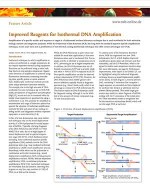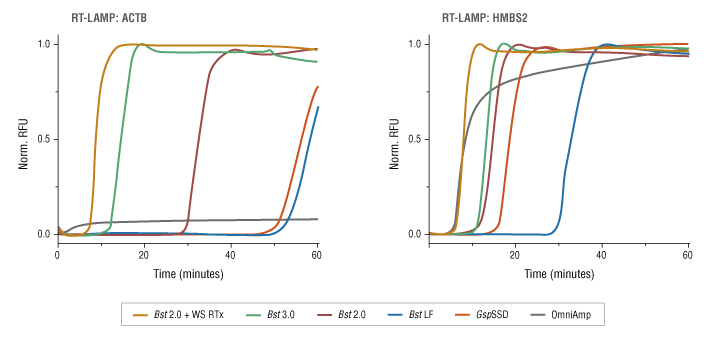Bst 2.0 DNA Polymerase
Bst 2.0 DNA Polymerase is an in silico designed homologue of Bacillus stearothermophilus DNA Polymerase I, Large Fragment (Bst DNA Polymerase, Large Fragment). Bst 2.0 DNA Polymerase contains 5´→3´ DNA polymerase activity and strong strand displacement activity but lacks 5´→3´ exonuclease activity. Bst 2.0 DNA Polymerase displays improved amplification speed, yield, salt tolerance and thermostability compared to wild-type Bst DNA Polymerase, Large Fragment.
Bst 2.0 WarmStart™ DNA Polymerase
Bst 2.0 WarmStart DNA Polymerase is an in silico designed homologue of Bacillus stearothermophilus DNA Polymerase I, Large Fragment (Bst DNA Polymerase, Large Fragment) with a reversibly-bound aptamer, which inhibits polymerase activity at temperatures below 45°C. The aptamer rapidly releases the Bst 2.0 WarmStart DNA Polymerase above 45°C and therefore no special activation step is needed to activate the polymerase.

„Improved Reagents for Isothermal DNA Amplification“
Dr. Nathan Tanner, New England Biolabs Inc.
Advantages:
- “engineered for performance”
- Faster
- Increased thermostability
- Improved salt tolerance
- Higher yields
New: Bst 3.0 DNA Polymerase – optimal for LAMP and RT-LAMP
Bst 3.0 DNA Polymerase is an in silico designed homologue of Bacillus stearothermophilus DNA Polymerase I, Large Fragment engineered for improved isothermal amplification performance and increased reverse transcription activity.
Bst 3.0 DNA Polymerase contains 5´→3´ DNA polymerase activity with either DNA or RNA templates and strong strand displacement activity, but lacks 5´→3´ and 3´→5´ exonuclease activity.
Bst 3.0 DNA Polymerase demonstrates robust performance even in high concentrations of amplification inhibitors and features significantly increased reverse transcriptase activity compared to Bst DNA Polymerase.
– in short: „engineered for performance!“
The superior properties of Bst 3.0 DNA Polymerase make it a first choice enzyme for all of your (RT)-LAMP Experiments.
Fast, single-enzyme RT-LAMP can be performed using Bst 3.0 RT-LAMP was performed using indicated DNA polymerase and Jurkat total RNA and primers for two genes (ACTB, left; HMBS2, right). Fastest results were observed with a 2-enzyme system, Bst 2.0 and WarmStart RTx, but robust amplification was also observed using Bst 3.0 without additional RT. Bst LF, Bst 2.0 and competitor enzymes showed highly variable performance, with slow threshold times or reaction failure on one of the two targets.
Not sure which polymerase you need for
your Isothermal Amplification?
We have an overview and background information on Isothermal Amplification in our current brochure.
Available Products
Product table
As of: 01.01.2024
Further information can be found in our Technical Resources section or at neb.com. Information on trademarks can be found here.


